#narrator chara theory
Explore tagged Tumblr posts
Text
Y'know, one aspect of the new Chara lore that just dropped that strikes me (besides uhhh, all of it lol) is that what we know about Chara for sure just really reinforces over and over again, how they really were a little kid. I know people headcanon them different ages because it makes sense to them or it seems to match their behavior or w/e, but really, 9 is their favorite number?? .... they even have a favorite number that they've discussed (apparently at length)???
Like, look at their sprite (and Frisk's) and then look at Kris'. Literal babies. And so much stuff little idiosyncrasies about them doubles down on them having these very childish likes and habits, like them overfilling their glass ("for efficiency!!!") and proudly toting it around, spilling it everywhere. (And the narrator theory, how excited they get over the toy chest in Home: "Look at all these cool toys!" Honestly, how much they talk/narrate in general?? Kiddo's here to A) chatter about everything they see and B) make fun of you. They're doing the Simpsons' HA HA point and laugh, you just can't hear it.)
Seriously, imagine them standing at the front of a classroom and introducing themself with the little things we know about them: "My name is Chara. I really like reading and drawing and golden flowers, my favorite food is chocolate, and my favorite number is 9."
I think that gets lost sometimes, with how Asriel is very clearly a little kid because of how he acts in the VHS tapes and how serious and eloquent Chara is when we see them at the end of the Murder Fun Times route, it seems like sometimes people think of Chara as much older and more serious than Asriel. I know their in-game lore is dark as shit, but there's so many little things that keep underlining that they're really a little kid who got in way over their head. Like, I seriously doubt they're even in middle school.
#undertale#chara dreemurr#narrator chara theory#text#this goes back to what i said in another post:#stop making chara look grown up and cool.#they are NOT cool#they are a cringe ass baby#URGHHHH i'm so worked up around the newsletter#i seriously feel like flying up into space#and flying around the planet again and again#until time goes backwards#they're so small and sassy ughhhhhh
44 notes
·
View notes
Text
So, about the new Chara/Asriel lore...
kind of yelled about this on my twitter already but-


WHAT IF Chara was keeping track in their mind cuz they know they'll only live to 100 or even just- maybe they started counting after accidentally poisoning Asgore and they felt bad so they spent a few days with Asriel "collecting" happy memories until Chara got to like- 99 or something or 999 and THEN decided to off themselves and come up with the plan to eat the buttercups and have their SOULs fuse to free everyone cuz they already had it in their mind after the incident that they're going to die, but wanted to give Asriel some happy memories before telling their plan for it-
and cuz chara's fave number is 9 and its the "highest number" thats why they kept count so it was kinda like, for them too- to die happy and with their BFF
because

and thats why Chara wnted to gather as many happy memories as possible to share with asriel before telling him the news about their plan to off themselves
so it wouldn't hurt him (or atl thats what Chara convinced themselves of)
and it wouldn't hurt Chara either cuz they are now holding "99 good memories" so they can't hold anymore cuz 9 is the highest number QWQ
I don't know- just some thoughts I wanted to share about this, and maybe spark up some conversations about this?
Also kind of off topic but now I can't stop thinking about just- Asriel maybe writing that for Chara to cheer them up cuz they were so sad
(maybe even post- the whole accidental poisoning the pie meant for Asgore??? since i headcanon that was the turning point for chara and why they considered offing themselves cuz of their guilt mixed with the self-hate and stuff)
But then Chara never saw the letter Asriel made for Chara telling them he still loved Chara and didn't blame them at all for what happened. And it was just an accident (since Chara obviously dies anyways)

I also can;t stop thinking of the implications that Asriel really did just innocently think because of DETERMINATION that Chara would be able to live for 999 years along with him (cuz Boss Monster)
Not realizing even IF Chara hadn't offed themselves early, that humans can only live up to 100 years or whatever-
#chara dreemurr#asriel dreemurr#undertale newsletter#undertale 9th anniversary#undertale theory#chara dreemurr theory#theory discussion#undertale#chara#asriel#my theory#my discussion#toby fox why you make us suffer like this#thanks for the new chara lore tho#but also fuck you#but also thank you#but also go fuck yourself lol#suffering#angst#dreemurr family#happy birthday undertale#lore#chara lore#asriel lore#chara is the narrator#narrator chara theory#dreemurr siblings
44 notes
·
View notes
Text
First impressions on the new Asriel letter
So...
It seems we finally have some new Chara content in 2024 !
At the end of the latest newsletter, Toby shared one more letter with us, which contained some very interesting things.
Let's try and dissect it a bit.
First, to start with the obvious, this is a letter written by Asriel about Chara. We can see this from such as things as :
Using the term "best friend"

But also because 9 is already a number associated with Chara.
Of course, it is present with them rather strongly during the genocide route. Such as during its ending, but also through things like the statistics given to some items associated with them in the route.
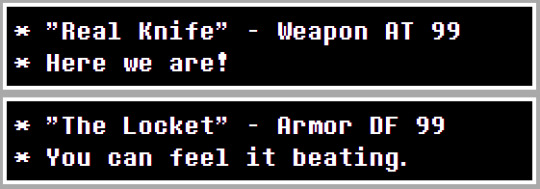
The same can also be said for Narrator Chara too. Such as how new special dialogue appears from the narrator if one were to attempt to talk to Asgore precisely 9 times.

The idea that it would be their favorite number thus comes fairly naturally.
Next, the few following lines rationalise this association, all the while phrasing it in a way that reminds of their speech at the end of the genocide route.
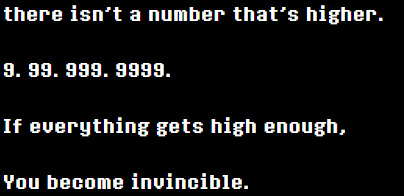

Finally, we have a few more minor implications.

Asriel & Chara with flowers together may call back to this image :
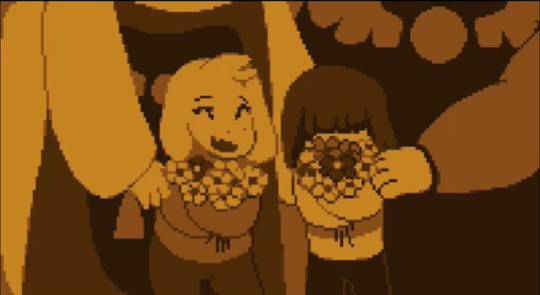
But it was also a very old concept, that could be found way sooner in Toby's concept arts for the game.
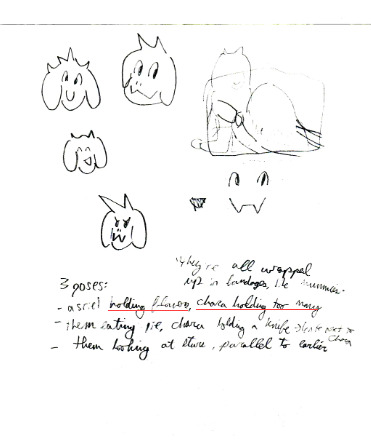
While Chara's "creepy faces" are openly mentioned in-game.

The friend is also refered to as "they", which may be noteworthy.
As for laughs...




The letter ends with
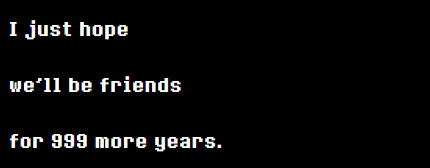
...But alright, what can we learn from it ?
Quite a few things, actually.
First, obviously, Chara's favorite number being 9 feels more like confirming some trivia or association that had been noticed by fans a long time ago than actual true new information.
But it isn't the only noteworthy thing in this letter.
Here are some lines that i had cut earlier on :
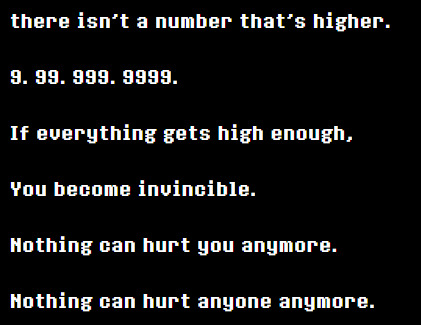
The last few lines feel somewhat unprompted from that initial context. But they may have secondary meanings.
First, they may be used to indirectly refer to a type of numbness brought upon by killing mentioned by Sans in his neutral judgments.

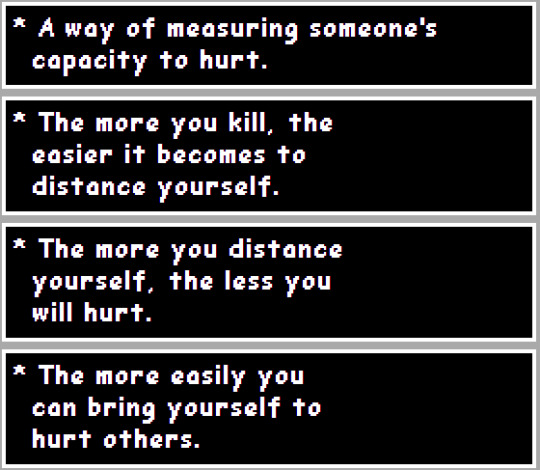
However, while that hint may have been intentional on Toby's part, it surely wasn't the main thing that the "in-world" Asriel who wrote this letter was trying to suggest.

The main "in-world" intended meaning of this section was far more likely refering to this :


While Chara did not ever tell Asriel exactly what happened in their past, Asriel seems to believe that the humans they had known did not make a good impression on Chara. Suggesting that they may have been abused or even have come to the mountain to disappear because of them. Regardless, this was all something that had worried Asriel regarding his best friend.
Of course, in the original game, those things remained mostly implicit or speculative. Asriel did not know these things for certain. And neither did we.
But bringing it back up today after so many years certainly feels like a very interesting choice on Toby's part...
Of course, this is all still from Asriel's point of view, which is limited. But metatextually, this is saying more than it looks.
Asriel associating Chara's favorite number the idea that with it, "Nothing can hurt you anymore" is a much more direct way of saying that he believes Chara was hurt by humans in their past than we'd seen before.
Again. This content comes from Undertale's 9th anniversary. It was pretty much Toby's one special occasion to show us content about Chara again. Which he actually did with this letter.
He only disposed of a limited number of characters or lines to either tell us something new about them, or give more precision/information about something which he believed was important for us to see.
From the metatextual context of asking "What was Toby trying to do by showing us this letter ?", him choosing to give more detail on Asriel's belief that Chara may have been abused of all things would serve no other purpose than to volontarily insist on pushing forward his line of reasoning to the fandom.
This suggests that Toby is very likely trying to tell us that Asriel is at least largely correct, and thus that the idea of Chara having been hurt in some form by the humans in their village is now significantly more likely.
Indeed, this had been an issue in some parts of the fandom. While that interpretation had been largely popular amongst most of it for a long time, there had been some voices calling out to the lack of clean proper evidence pointing to that which weren't somewhat speculative. So this seems a lot like Toby attempting to point us in the right direction. Seems like the simplest answer may be the right one, Occam's razor strikes again.
A new questions also now asks itself : Is this meant to suggest that this was Chara's motivation for power ?
Having power, so you are no longer weak ?
Not being weak, so you can no longer be hurt ?
A way of feeling "in control" ?
There were already some implication of Chara disliking to show weakness to others in the past. This would be coherent with those.
In such case, the genocide route may be a macabre recontextualisation of this original motive on Chara's part.
It might also be made relevant in the context of Chara's plan, though that deserves its own future post.
Besides, Asriel saying this highlights how much he cares about Chara. Which is always nice to see.
As a side note :
Between the demo and the final version of the game, the flavor text for the faded ribbon was changed from a regular one to one which raised a few eyebrows :

While some people had tried to use this line as evidence of Chara having been abused, many other voices had (fairly rightfully) pointed out that this piece of "evidence" was quite fragile, due to things like other interpretations of it being just as plausible, the fact that it specifies " 'monsters' won't hit you as hard" which wouldn't fit Chara all that much, or simply the lack of other similar implications elsewhere in the game.
Now that we do have such implications, this argument, whilst still a bit of a long shot, is at least not quite as far fetched as it used to be anymore. The item is a thing which gives you DEF (increases your numbers), and prevents you from being hurt.
We are not quite done yet, though :

These lines feel like they also have meaning.
Once again, there is an indirect reference to the genocide route, with 99 being the maximum value for things like HP, or the next required EXP to gain LOVE. When you have them, you cannot get any more. It is the absolute.
However, there seems to be another strange connection to make here.
What is the opposite of a so called "good memory" ?

The bad memory is an item obtained from the memory head amalgamate.
It feels noteworthy as it, along with the "Last dream", are the two items in the game who's effects are theorised to have something to do with NarraChara in the way they are presented/work. (Suggesting that the memory/dream may come at least partially from Chara.)
For a reminder, the bad memory is a item that actually decreases HP by 1. Unless it is eaten on the brink of death, in which cases it restores all HP instead. Bringing it to the "highest number".
On top of that, this item also had a strange specificity to it :
It is impossible to drop it.


With this additional context, one may draw parallels between the Bad memory item's effects and what Asriel is saying, only in a reversed way, and applied to Chara.
In the same manner as previously. The previously existing theories trying to tie the bad memory to Chara now find themselves being rendered more plausible. In fact, given that these lines directly follow the previous ones, you may even associate them to make the argument that the memories could be of Chara's past on the surface hypothetically. Though that would likely be stretching it.
Also :

39 left.
Pretty impressive, the way every last line in this letter can be read as a genocide route reference one way or another.
And... the code of the page describe the contents of the page as "Here's a letter".

This is also the wording used in the lines with which Toby introduces us the letter.
This wording of this feels very significant considering who the letter is talking about...
So i suppose that makes for even more NarraChara fuel to have Toby writing down such things.

For one last thought, those couple lines.

If one were to follow a certain interpretation of things such as "Mr Dad Guy", the "future of humans and monsters", and Chara's relationship with the concept of "efficiency" & "usefullness", then they might be readable as an allegory for pre-death Chara's view on their role within monsterkind & one of their motivations regarding their plan. (along with their hate of humanity).
And this odd insistance on the term "happy" throughought the message..Is there a chance it could be refering to those secret lines, stored within the game's code in the echo flower room number #9999 ?

Some of the things mentioned in this post are somewhat stretchy admittedly. I am not yet certain of which ones of these would i actually argue for and which are only a product of first impression brainstorming.
Nevertheless. There are many many new ideas to explore regarding Chara now.
Thanks, Toby !
#undertale#undertale theory#chara#undertale chara#chara undertale#narrator chara#asriel#undertale asriel#asriel undertale
291 notes
·
View notes
Text

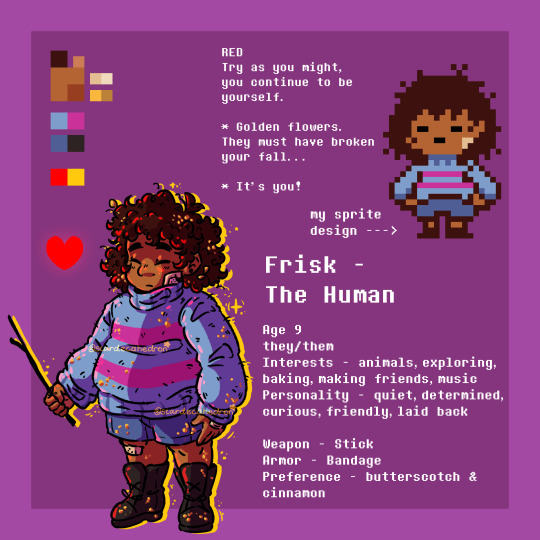
* Greetings. I am Chara.
* Still just you, Frisk.
I've been wanting to finally make full refs of my interpretations of Frisk and Chara from Undertale! This is a continuation of the the refs I made two months ago of my human soul designs right here!
I have spent nearly nine years at this point drawing these two kids haha, and I think I have finally nailed down how I want to draw them. But who knows I might always end up changing them again lmao.
And yes, I even made custom sprites of my designs of my designs, here they are below! vv

* Chara and Frisk both use they/them in canon!
kofi // instagram // artfight // bluesky
#undertale#safeutdr#chara#frisk#my art#digital art#artists on tumblr#i usually associate chara with the save points and frisk with the red soul. it makes sense to me lol#although since these two are so intrinsically linked in the game they also share motifs of souls and save points#if youre not subscribed to the narrator chara theory then we cant be friend (joking)
92 notes
·
View notes
Text
There's some real funny character stuff that occurs post-no-mercy and into a true pacifist.
Chara seemingly returns to their old self, as the narrator, on that post-geno-pascifist. Frisk still gives their name as Frisk at the end.
The game is actually pretty forgiving about both geno and pascifist. Because there's nothing in either or that suggests that the world has fundamentally changed.
... But Chara, isn't forgiving.
Undertale falls with the idea that the characters are people. It asks "if a protagonist can actually Save their Game in real life, how would that affect the world and its people?", It follows every trope when it comes to RPG monsters, asking "If our hero is so heroic, what about all those monsters they slaughtered by the hundreds to get to the end?"
Its a deconstruction on the ideas of RPG. Most of the time, it reconstructs just as well, letting you explore what you'd like and still making it just in time for a happy ending...
... Until you decide to go on a killing spree.
In a reset post-geno, you have only one LV. By the end, the kid we've been playing identifies themselves as Frisk. Chara is still the Fallen Child we name, and is still the fairly amicable narrator.
Until the end.
If we choose for Frisk to leave Toriel (to... gods knows where), the picture we receive has all our "friends" crossed out, and the character of Frisk replaced with Chara.
( This might imply that they went after our friends... but truth is, at 1 LV, shared between Frisk and Chara, they have no killing intent at all. )
Crossing out this picture is a "Fuck You" to Chara. Frisk and Chara finally get a happy ending... but you, the Player? Absolutely Not. Chara won't allow it.
If we choose for Frisk to go with Toriel, Frisk lives with her and can be found sleeping in a bedroom as we watch. Once Toriel leaves a pie slice, Chara turns over and stares at our "camera".
( Still LV1, you can't get the true pacifist run without LV1 )
All this shows...
That Chara and Frisk share the LV. And about after Ruins, in Geno, is where Chara just takes center stage. Only in aborted runs or resets, does the stage return to Frisk and Chara chills out.
That Souls transcend Time and Space. Its the only way Chara would know enough or be around enough, to know what we the player did in a post-geno-pascifist world and ending.
Neither Frisk nor Chara control the Red Heart. We do, the Player. Even though the Red Heart is Frisk's soul, and that Chara is attached to it because Chara is a post-mortem consciouss that should have a Human soul, and persumably, their soul was Red too. ( I would've said that we don't know, because there were other humans... but Chara's speech in Geno specify Frisk. )
Frisk, cannot do a genocide route. At the start of it, Chara takes over right away, and stops talking to Frisk, and starts talking to Us. in every Neutral and Pacifist Route, Chara talks to Frisk. In Geno, Chara takes over, and Frisk isn't a factor. But once Chara gets the Red Soul, from us the Player, Chara will willfully just go back to talking to Frisk. Until we, the player, try to get involved in the ending scene--in which case, Chara takes right back over.
Chara encourages mercy and mischief, when someone is playing the game to be merciful. Very rarely do they interfere with the choice (one known exception is refusing to allow crying), and only in the true lab does Frisk interfere with Chara's set choices... of which Chara will staunchly back up Frisk's reactions from then on.
Even post Geno, Chara encourages mercy and mischief, but this is more specifically pointed to Frisk.
( Because if Chara just wanted to screw everyone, why wait for a geno-play? Why not just do it in a regular True Pacifist... Its because they don't actually want a Genocide. Who does? )
Chara wants to help, and protect, Frisk, as the "narrator".
They read to Frisk, they understand Froggits for Frisk, they give options, give descriptions. (I've got my own personal HC about who exactly is reading the HP, EXP, LV, ATK and DEF, because I'm pretty certain Chara isn't that indepth about monsters they couldn't have possibly met.. but they're definitely the flavor Texts and Descrptions). They kinda translate Frisk for Us the Players, so they do semi-know that there's a third (HC: Or fourth) party here.
( I believe the reason why ties into how the Red Soul operates as a human soul. Free Movement? Prime power to escape nearly any situation? Red Monster Magic about alarms and warnings? Red Text meaning Danger? The Red soul pays attention to Danger, and its first instinict is to Flee--thusly, Frisk is actually a pretty scarred kid. )
Chara's first instinict upon waking up to Frisk, inspite of how much others have claimed that Chara hated humanity... was to help by any means necessary with what little they can do. Especially since Frisk is a scared kid who doesn't know what to do at all.
So when that allpowerful third-forth party comes in, and decides that death by any means necessary is the goal...
What's Chara to do, except, take the brunt of it instead? Let Frisk take the backseat, and Chara does the dirty work so that Frisk doesn't get hurt.
Then Chara performs their ultimatum. They sever our connection to the world, and it stays dead, or we give them the Red Soul.
And upon taking the red Soul, Chara seemingly returns to just the merciful-mischievous narrator, at LV1, with Frisk.
... Only now, they stay with Frisk. And when it looks like that we, the player, are looking at them outside of the underground--Chara looks Back.
They took the red soul to ensure this little kid, Never Gets Bothered or Hurt by Us again.
ADDENDUM:
This ain't the first time in anime fiction where a dead semi-psychotic seemingly soulless spirit, fond of mercy and mischief but also fond of giving those with ill-intent their just rewards, who possesses a younger soul and bolsters and protect them.
Who woke up confused about where they were and what was going on.
Who definitely got themselves killed pulling something that didn't work, and they still had to fix it after they was dead.
Who's actions did result in a friend of theirs becoming a total asshole in his next life.
Who has played both psycho and savior.
And was a royal child.
... And y'know, they just happen to like children's card games.

#undetale#chara undertale#frisk undertale#chara#frisk#narrator chara#true pacifist route#genocide route#undertale spoilers#analysis#theory#yugioh
62 notes
·
View notes
Text
This is the last poll today, sorry for the poll spam :P
#undertale#chara#undertale chara#narrachara#narra chara#undertale narrachara#narrator chara#undertale narrator chara#undertale theory#poll
8 notes
·
View notes
Text
So I'm making this post because I saw a YouTube video the other day where the YouTuber made an offhand comment poking fun at people who don't think Chara is evil, and that was enough to annoy me, but also, it inadvertently brought up a good point for me personally.
I was originally firmly in the camp that Chara was maybe not the best person, but they weren't evil, and the Genocide route is an outlier, and I was upset because I didn't feel like they were considering any of the other routes at all (which they weren't), but it made me realize I was also completely discounting the Genocide route, and I can't just do that for the sake of an easier analysis because it's there for a reason. And I certainly can't get mad at this person for doing the exact same thing I was doing. So here is a hopefully as objective of an analysis of Chara as whole as I can get.
At first I tried marrying the two versions of Chara that we see in the game: the traumatized and suicidal child who wanted to sacrifice themself for the sake of freeing monsterkind and getting revenge on humanity which left them hurt on a fundamental level and wasn't really the best to Asriel, probably because they still hadn't unlearned mimicking the way they were treated and then never got the chance to, with the kid who actively encouraged the slaughter of all of the monsters in the Underground and then destroyed the world after killing Frisk themself and seeing what the connection was. And to be honest, I didn't really find anything.
Then I started thinking about Frisk instead because it was late and I couldn't keep my focus, but that turned out to be really helpful because, while Frisk is a player stand in most of the time despite being revealed to be their own person, there are things that they do by themself, either implicitly or explicitly, and if you try to analyze them to figure out what kind of person they are, you also get two wildly contradicting versions of them. And which version you get is entirely dependent on how you choose to play the game.
Because your choices have a lot of weight to determining what happens in the game, not only does it affect which ending you get, but it also effects how you get there and how you choose to tell the story. You get to choose what kind of story you want, and with that choice comes whatever characterization of Frisk would fit the most for whatever you are doing.
If you play pacifist or neutral without starting off with a genocide, when you first encounter Sans, it's implied Frisk laughs or at least has some sort of reaction, no matter how many neutral runs you have done without true resetting beforehand. Frisk sits through and humors Papyrus in all of his puzzles and japes even if they've heard the same joke or solved the same puzzle a thousand times beforehand. Mettaton comments on them looking bored at the beginning of the musical if it's not your first playthrough after true resetting, and he gives you the option to skip it, but he doesn't say Frisk looks hostile or anything, and in the fight against him, you have the option of just calmly flipping his switch to just get the fight over with. Sans implies either Frisk looks like they're really thinking about what they did on a first neutral run or they look bored and not particularly bothered in subsequent runs after that unless you do pacifist which he then comments on the fact that they were exceptionally kind to everyone and even when they ran away, they were smiling the whole time.
But if you do a genocide run or start off with a genocide run, Frisk doesn't react at all to Sans' handshake joke, they don't sit through any of the puzzles Papyrus has and they don't acknowledge him at all, they give you the option to just keep taking and taking snowman pieces until the snowman is dead, and they move on their own to walk toward whichever area boss you're up to at the time in a threatening manner and even move toward Monster Kid on their own to intimidate them. They're really into the killing people thing in these routes while in the other routes, they're a lot more into engaging with people or at least giving you a better prompt of being willing to spare them.
So if it's true that Frisk has wildly different personalities and goals depending on how you play the game, it must be true with Chara too. For the majority of the time, Chara was just a kid who loved monsters and loved their family and felt extremely guilty for accidentally poisoning their dad and didn't know how to handle it and probably guilty and unworthy of their love because they were human and weren't used to receiving that kind of care in the first place. But if you choose to play the game where another human who falls down and decides to kill as many monsters as possible, Chara will be another human who hates monsters, or at least, grew to hate monsters and was only concerned with getting more and more power as they woke up because that's the thematically appropriate characterization of them for that route and way of playing.
So they're both not evil and evil, but which one you get is entirely dependent on you.
#undertale#utdr#chara dreemurr#frisk undertale#undertale analysis#honestly though; it's a lot more fun to play around with the version of Chara that isn't evil in my opinion#I really love the narrator Chara theory; but I had to put that aside for a moment because it's not confirmed canon lol#suicide tw#chara#frisk
25 notes
·
View notes
Text

Three of my favs have bob cut
#katya pafl#chara undertale#emu otori#artists on tumblr#amynart#I have been a fan of Chara for 10 years#and the theory of Chara being the narrator is canon to me#I still enjoy the aesthetics of them being feminine and 'ooouuughhhh evil child' though#by the time I got to Emu I was sleep deprived and didn't sketch the foundations#I would have squished her face proportions a bit if I was on digital
5 notes
·
View notes
Text
so the thing about chara is that they're not really a whole like. separate character.
they're YOU.
explicitly, they are guided by YOUR decisions, YOUR choices, you theoretically give them YOUR NAME when you begin the game. if you consider them responsible for frisk's actions in the game, you have to acknowledge that YOU are the one who is ACTUALLY responsible for frisk's actions, as the player who. y'know. makes the actual fucking choices.
and chara reacts to what YOU DO to them. more specifically, chara reacts to what YOU DO to YOURSELF.
THIS IS WHY A GENOCIDE RUN FEELS BAD.
you are torturing yourself! you are forcing yourself to kill cute puppies and murder a wonderful skeleton who has never done anything to hurt you in COLD FUCKING BLOOD! usually AFTER you have completed at least one run where he becomes your best fucking friend!
this shit HURTS! every lets player i've ever watched do a genocide run has talked about how BAD it feels, how it's a combination of supremely boring to farm all possible kills AND absolutely gut-wrenching to murder these sweet innocent monsters who loved and cared about you in another lifetime!
and chara's response to this is YOUR response to this. they make it so that you can never again play this game without feeling the guilt of killing everyone you knew and loved and who loved you in return in this game.
whereas in a true pacifist run, you get some real catharsis. you save the world, you fix the mistakes you might have made the first time around, you save the sad broken abandoned child in the center of this story, and in so doing, you save YOURSELF. you get to a point where you straight up CAN'T DIE because you love this world so goddamn much.
anyway. chara is you and you are chara, and i understand why people don't always explore that in fanfic (hell, I sure as hell didn't explore it in my fancomic) but like. chara is you talking to yourself and at the end of a genocide run, chara is just telling you what you already know - that you can't fucking take back what you have done. even if nobody else remembers, you always will.
#chara#undertale#chara undertale#undertale theory#ut theory#this is why i love 'chara is the narrator' theory so much
54 notes
·
View notes
Text
the fact that save files in deltarune are quite possibly even more diagetic than they were in undertale fills me with fear and dread like no other
#june's deltarune brainrot posts#june's undertale brainrot posts#that fucking menu. That Fucking Chapter 1 Save File Menu.#why the fuck is he There. why does he talk about the saves Like That.#why does he talk like they're so . Alive ?? why does he do that.#why does he take such interest in exactly what you do with them#why does he denote whenever you do extremely specific shit#like why wh ywh ywhy whywh yw does he find it so fucking special when you copy the same save file over all 3 slots#why is he even more fascinated when you OVERWRITE one of those fully copied save slots#and. and and and. god fucking dammit and.#AND WHAT THE FUCK IS THE THREAT LEVEL. WHY IS IT HIS ONLY INSTANCE OF “VERY INTERESTING” IN THAT MENU.#GOD FUCKING DAMMIT TOBY WHAT ARE YOU COOKING#and then theres the fact i Literally Just Thought of that what if the post chapter 1 save menu narration is Also a character just not gaste#like. if you think really hard about it to the point that andrew cunningham's brainrot meter starts crying out in pain#the lines in that menu are extremely very incredibly insanely slightly might be somewhat a tiny bit weird-ish#like i cant stress enough that this is a complete crack pot theory but What If It Is yknow#the line that sticks out to me as the most “EVIISMBSATBW-I” ( look at the previous tags to see what that acronym stands for )#is “There's nothing to erase.” again this is entirely 100000% brainrot and i am off the shits#but like. surely i can't be alone in thinking the wording is eeeeever so slightly odd there#like surely it could just be something like “File is blank.” or “Can't erase a blank file.” or something simple like that#but it's specifically “There's nothing to erase.”#There Is Nothing To Erase.#surely i can't be the Singular One Person In the World who is at least slightly reminded of chara's post-geno dialogue with that line#yes i'm entirely insane welcome to june brainrot. anyways#tag-exclusive rant over enjoy the#elusive june rant
1 note
·
View note
Text
something something about how if you choose to go by the narrator chara theory it'd heavily imply that chara idolizes undyne and even without that undyne embodies several of chara's traits. the association with the number 9 as undying throughout her stats, taking things to their most extreme during her hangout which lead to her house burning down, her hatred of humanity, her closeness with asgore, etcetera. meanwhile flowey's favorite character is papyrus who also shares several traits with asriel. namely their unwillingness to kill and their desire to impress their best friend to the point they'd set aside their own feelings, for example: the grillby's phone call with both undyne and papyrus.
something something about how undyne and chara are both devoted to the freedom of monsterkind via the extermination of humanity but whereas chara's plan to free monsterkind heavily centered around asriel yet still failed to take the idea that asriel just didn't have it in him to kill into consideration, undyne tries her best to distance papyrus from her plans regardless of both his insistence and his power due to knowing he wouldn't be able to bring himself to kill someone even in a kill-or-be-killed situation. something something about how undyne is a grown adult whereas chara was an extremely young and troubled child. something something about how things could've turned out better if only chara were more mature and in the right state of mind.
(i really have to wonder what chara themself would think when hearing all that from undyne, especially as it only happens in a pacifist run and they'd likely already have had several of their outlooks challenged at that point via frisk. i wonder how it would feel to hear a situation so incredibly similar from someone who is so similar to you, yet made such a different decision and seeing how much better things could've turned out if you were just more thoughtful of your closest friend. if you were just a little more mature.)
#chara#undyne#asriel dreemurr#papyrus#utdr analysis#undertale#🌼 - ramblings#i usually avoid basing my analyses solely upon theories but i feel this works even without narrachara#since the similaries are there regardless of if chara idolizes her
400 notes
·
View notes
Text

Collab with @raidendefender for doing the lineart and flatcolors I did the sketch and shading of Poketale Ascendance Chara playing with the Celebis while Raiden watched
ALSO I should mention:
the cuts on Chara's arms arent caused by her hurting herself
but rather from (in my Pokemon/Undertale AU: Poketale Ascendance) her human parents actually did that during her life while living on the Surface before meeting the Creation trio and Arceus adopting her/taking to the pokemon world (also p much all of Chara's body is scarred up which is why she stays mostly covered up, mostly cuz she hates being asked about them and all soo yeah.)
if you're curious about the AU you can read here: https://tapas.io/series/PokeTale-Ascendance/info
//I have the parents written that way cuz i REALLY strongly believe in the narrator chara theory + all the implications from the game about chara potentially being abused or mistreated while living with the humans before falling to the underground in canon sooooooo yeah//
if you got a different interpretation then cool, but thats just my silly little headcanons soooo yeah. thats why//
just a lil disclaimer or whatever i guess
#fanart#chara dreemurr#pokemon fanart#pokemon#undertale#poketale ascendance#raiden#mgs4#raiden mgs#mgs raiden#narrator chara theory
10 notes
·
View notes
Text
The effects of LOVE are quite overstated.
It has been quite frequent to see the concept of LOVE mentioned by Sans in his judgments being interpreted as a force progressively depriving the person possessing it of all empathy or judgement until they are rendered into practical killing machines whilst approaching the cap of 20.
Whilst there are some truths to part of these concepts, interestingly, extrapolating implicit data from the game suggests that the effects LOVE have on a character's personality, whilst existing, are not as significant as they are generally believed to be.
Let's do a proper analysis of what we can say of LOVE's effects based only on the in-game content :
First, aside from Sans' words about it, do we dispose of any clear cut examples of changes relating to LV to analyse ?
That might seem like a silly question, but some of the lines that are often attributed to LV-induced personality changes turn out to not actually be LV-dependent once you check the game's code.
For instance, the narration of the bag of dog food is decided through kill count, not LV, meaning that it possible for instance to get the 'pessimistic line' despite not gaining any LOVE, and thus, this line cannot be attributed to changes related strictly to LV gain and isn't very useful to us here.
Actually, the amount of direct evidence we see of it having any effect at all which we can be certain off is quite small. But such a thing does exist via interactions relating to this dummy :
LV1 :

LV2+ :

LV5+ :

LV 8+ :

The only factor involved in deciding which of these lines will appear after deciding to punch the dummy is LOVE, it is notably distinct from other similar interactions like those mentioned above which tend to be governed by some variation of a kill count or a check regarding wether particular characters were killed.
As similar LV can be reached through killing various amount of monsters or varieties of monsters, unique or not, no equivalence can be built between the required LV for each of those interactions and particular character(s) or amount of monsters required to be killed to reach said LV.
We can thus only take the code of the game at face value and conclude that those changes are strictly caused by changes dependent on the influence of the LV we've gathered in our route so far.
The first pattern that can be established is that the narration in the left column reports Frisk punching the dummy with increasing levels of strength following our command as LV increases.
In the right column, there is a split between the four lines in the middle regarding the way the narration reports it.
The first two lines are narrated in the more common style, notably, explicitly reminding us that the actions or thoughts presented are Frisk's by refering to them as "you" as the subject of the sentence.
Those first two lines describe Frisk going from regret to a form of hesitant apathy regarding the fact that they've just punched a dummy as LV grows.
The latter two lines, however, mark a change in the narration type.
The "you" is dropped, and the thoughts presented are instead presented in a declarative form. This form is often used for first person affirmations, but can also be used outside of it in order to showcase a strong emotionally-driven reaction.
This ambiguity is particularly relevant here, as it blurs the line between wether those thoughts are Frisk's, the narrator's, or both. A detail that gains much importance under the NarraChara theory.
That being said, this nuance leads to a similar conclusion regarding LOVE in either case :
If the thoughts are fully Frisk's, then the last lines have Frisk moving from a hesitant apathy to a confident one before ultimately "feeling good". This would stay in line with the previous pattern.
(Although it is worth nothing that the "feel good" part may be at least partially due to a kind of natural endorphin release in Frisk's body from the physical exercise of "punching at full force", and thus could be only indirectly due to LV.)
If NarraChara is taken into account, then this would mean that this transformation in the tone of the narration in the last lines is due to LV related changes on Chara. And that this ambiguity in the phrasing of who those feelings belong to may indicate that the same observations we've just made on Frisk previously would apply to them similarly.
(Note : Given that the game code and files suggests that Chara and Frisk share their statistics, them both being affected by this same LV count would be coherent.)
In the official japanese version of the game, those lines for the dummy are mostly similar. However, the first two lines of the left column are a bit less distinct from each other, and the narration phrasing ambiguity seems to begin on the 2nd line of the right column rather than the 3rd.
Okay, so, what's wrong about the common perception, then ?
So far, it seems that LV does have some kind of trend that leads to growing apathy regarding the suffering of others and more aggressive actions being taken as a result of identical stimuli as it increases. That doesn't sound too far off ?
Well, sort of, but careless extrapolation made from those basic ideas have led to the emergence of theories and interpretations that treat those effects as being more consistent, generalised, and effective than can hold up to the scrutiny of our known cases through aggressive neutral routes.
Here is what i mean :
In some of the more aggressive variants of the neutral route, it is possible to attain a really high LOVE that comes close to what we see in the genocide route. Comparison between those routes and the genocide one, or sometimes content from these neutral routes themselves, can help show us incoherencies in some of those popular interpretations regarding how much difference LV really makes.
The first one that comes to mind is a popular one among 'Chara Defenders', suggesting that Chara's openly aggressive actions & narration which are specific to the genocide route in particular would really be a result of "corruption" induced by the LV-related changes which we would have forced onto them.
How well does this theory hold up through the aggressive neutral routes ?
Well...
Not very well.
To make a 'short' list :
Chara's "corruption" in genocide would generally begin to show as soon as LV3 at the end of the Ruins, however, they show no particular signs of this "corruption" in any neutral routes despite being able to reach much higher LV's of say, 14 near the end of the game.
It is possible to arrive at the end of the Ruins (or other areas) whilst having the same LV as in genocide during a neutral route, yet Chara shows none of those "corruption" lines in those cases either.
It is possible to finish many areas in the genocide route whilst having a lower/higher LV than usual by only fighting particular monsters who give you more/less EXP than average, yet none of Chara's genocide lines are changed to account for this lower of higher LV.
It is possible to abort the genocide route at many points by sparing a particular monster or failing to reach a kill count. When this happens, Chara's "corruption" lines suddenly disappear although the LV doesn't.
This still happens even if Chara's LV would have remained the same wether the monster was killed or not. Thus the lack of extra LV from the spared monter cannot explain this difference.
The aggressiveness shown by Chara does not seem to correlate with their growth in LV. For instance, they treat Toriel more harshly than Papyrus despite a past connection between Chara and Toriel and a lower LV at the time of that encounter.
Regarding some interpretations of the final genocide scene : Why would Chara oppose us for what we did at this point in time ? Shouldn't they still be "corrupted" ? The files at this stage still continue to list our LV as 20 indicating that they should.
Similarly, regarding some interpretations of the soulless pacifist route : If their previous behavior came from corruption, why would Chara kill at this stage or follow up on their previous plan ? By now our LV has long been reset to 1 and said corruption should no longer be in effect.
For all these reasons, it would not be coherent for the peculiarly aggressive behavior shown by Chara during the genocide route to be strictly caused by LV-induced changes.
To be fair, this time some minimum amount of LV is required to progress through the route and access many of those lines, meaning that a minor impact of said required LV cannot be ruled out, but this does mean nevertheless that the primary reason as to why Chara behaves this way in genocide is not related to their LV.
Actually, once you remove from consideration all those things, what you are left with in the rest of the genocide route is a Chara that hardly seems all that impacted by LV at all despite having a very high one.
In New Home, they still display some hints of emotional reactions in spite of a LV of 19.

And throughout the whole genocide route, NarraChara continues going through the regular encounters with the same jokes or sarcasm-filled comments as they would in any other route (If you take the time to ACT a bit or read the narration before killing that monster.) Once again, even with a LV of say, 15.

That doesn't make the very high LV's seem like they turn one into that much of a mind-numbed killing machine does it ?
Okay... Well, what about Frisk, then ? Our other example ?
There are some more narrations out there who can bring us a bit more information about Frisk :

The Sans fight can only be triggered if all previous checks of the genocide route have all been properly met up to this point. This means that it is not possible to start this fight at any other LV than 19, as the NEO fight is scripted to send you to that LV if the criteria for Sans are met.
Therefore, the narration of the Sans fight talks about a Frisk that necessarily has a very high LV of 19.
And yet...


Even at this point, Frisk does not seem to be immune to thoughts regarding the morality of the actions their body has undertaken. It quite literally appears to weigh on them.
This isn't a one-off case either :
If the genocide route is aborted in Hotland, Mettaton NEO has some special dialogue that goes in the same direction :




he says it quite clearly :



And, the same thing also applies regarding the regular encounters too. The ACTs Frisk can take and their behavior whilst executing them remain unchanged compared to a pacifist route, even during the end-stages of genocide in Hotland.

Of course, it isn't like we could have expected Toby to adapt the ACTs and narration of all encounters to vary depending on LV either, that would have been very tedious to code, but such a pronounced absense of any change is definitely noteworthy.
This all leads us to a few conclusions.
It is correct that LV can affect one's personality to some extent, but :
The effects of LV are not consistent through time & situations, they show up quite sporadically. Most of the time, you could hardly tell the difference between someone with high LV or merely LV1 during an average interaction.
Even having an extremely high LV does not dehumanise you. One can still feel emotions and conserve proper judgment or capacity for self-reflection.
The growth in LV magnifies the impact of its effects when they do manifest, but it does not seem to alter the frequency of such events.
It is not possible for LV to be the determining factor in Chara's behavior during the genocide route.
As Sans originally said : LV is above all a capacity to hurt, not a permanent necessary degradation of perception.
#undertale#undertale theory#frisk#chara#narrator chara#sans#mad dummy#mettaton neo#undertale lore#undertale frisk#undertale chara#Its been a while since i posted something#This post is somewhat of a re-write of one of the first theory related posts i'd ever made on reddit in a way ?
120 notes
·
View notes
Text
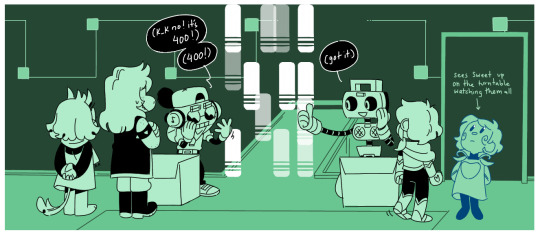
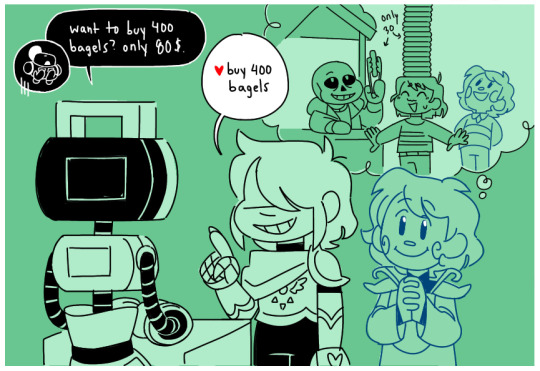
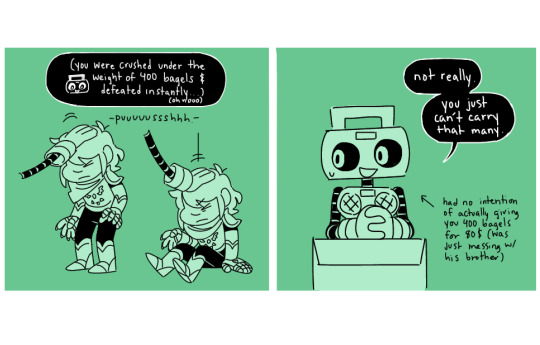
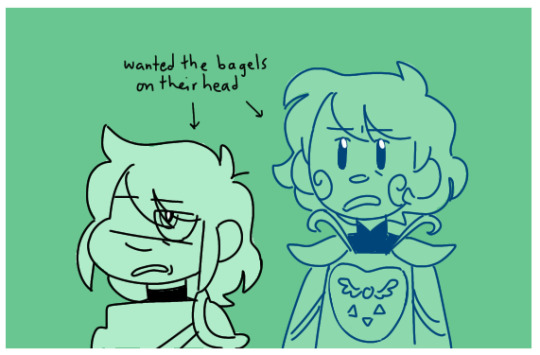
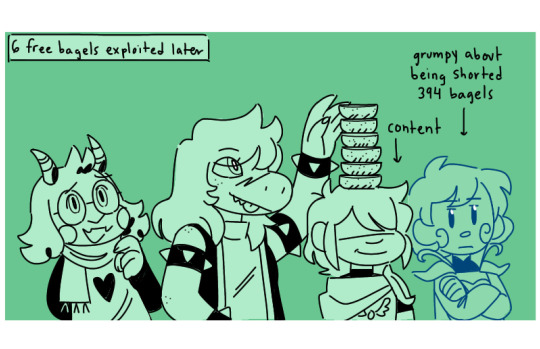
I’m just a firm believer in chara-narrates-deltarune-too theory and also that k_k just commits to the bit to mess with his siblings
#dont tag as ship#the art gallery#deltarune#undertale#scc#this is one of those 'go into a fugue state to finish this no breaks no music Just Drawing' for uh. 7 and a half hours#its not even funny to me HDBSNDNFBBD
2K notes
·
View notes
Text
CHARA AND THE NATURE OF BEING A FALLEN CHILD
I know that folks like to ref Asriel's "Chara hated humanity" quote...
... But bruh, Chara was like 10. Most 10 year olds, and well into their teens, are gonna claim they hate humanity. You've done it, I've done it, its not new.
That isn't to say that Chara didn't have some severe trauma attached... But more realistically, there was probably only a few people that they were absolutely furious and hurt about. Probably those who hurt them pretty badly, but can't quite articulate the specifics.
Mix that, with the history of Monsters' and suddenly, this 10 year old has an easy, if poor choiced, coping mechanism--its easier to say that all Humans Is Bad when you can back it up with a war that happened centuries ago, and you're very young and small and aren't quite capable of understanding that, sometimes, individuals are often real pieces of shit and in life, one can run into them or land with them at the roll of chance.
But individuals don't inform the whole. That doesn't change the fact that individuals can do greater damage over a long period of time... but it doesn't inform the whole.
... However, a 10 year old isn't going to understand that.
Its easier to generalize. Children do it all the time, they're young, they don't have the experience or the growth, to have the capability of full realization and all the little things attached.
I know that quite a few folk will reference the tapes in the True Lab. How Asriel was hesitant and definitely disliked their plan...
With the addition of "Chara wasn't the Greatest Person"
... But it wasn't a bullied hesitance as others might think.
Asriel literally went out of their way, to grab (presumably Toriel's) camera, in order to record their sibling performing antics. You don't do that when you're bullied and subjugated.
You don't ask for creepy faces to record, you don't trick them into smiling for a camera that isn't even recording--because tricking a bully makes you a target for a bully.
You do that for a sibling who does silly things.
No character in Undertale is perfect, or omniscient. Each one has their on misconceptions about one another, and evidence is laid plain.
Asriel has this bad habit, as Flowey, about projecting. Putting someone they like on a pedestal. What they did for Chara, they repeated for Frisk (even though it was primarily Chara's influence and memories that saved Asriel).
Its less of a trait he's always had, and more of one he's developed as Flowey. He was soulless when he said it--he's still projecting, its simply, not to a malicious extent anymore.
The Frisk Asriel want them to be, doesn't actually exist. Most of Frisk' behavior is minimally implied, mostly overshadowed by Chara's influence as narrator and choice giver, and our choices as the Player. Frisk does little that can be discerned.
Asriel was being insensitive, but for good reason. He was trying to handle things, and was losing the feeling of having a soul-- insensitivity, and not being aware of all the facts, is the minimum of what's going on.
Plus he's like, 10 too.
Chara is the ultimate challenge of Undertale.
Undertale, as a game, promotes the idea of understanding and forgiveness, and the fact that even with one problem laid out, we don't know everything.
Any time you can tell someone that you're not going to fight, and they stop fighting too, simultaneous showing each other mercy? That's a victory here.
Chara's Challenge to the player, not to Frisk, but the Player, on how to forgive and understand someone, when you only have their mistakes on the board. You only see the "worst" they've done or are capable of doing.
Asriel says that Chara wasn't the greatest... but he, at no point, ever compared Chara to himself, as Flowey, unless its the No Mercy Route (Which Flowey cheers for).
UT tells us how, it merely does not have the mechanics on display, because Chara's Challenge is not a fight. Chara is far too willing to let you think the worst of them, neither confirming (outright) or denying (at all).
The challenge is simple, like any other monster.
WILL YOU SHOW MERCY (TO THE FALLEN CHILD)?
#undertale#chara#narrator chara#chara undertale#asriel dreemurr#flowey the flower#asriel undertale#flowey undertale#analysis#theory
52 notes
·
View notes
Text
im autistic so i made a post rambling incoherently about chara (maybe ooc hell if i know) for too long let’s go
I FUCKING LOVE CHARA!!!!! ever since i discovered chara existed (via a playthrough i watched because i was too young and silly to do the geno route on my own) in like 2016 i LATCHED onto them. idk what kins are but if i could kin anyone it would probably be chara. i have projected so much onto them throughout the years. even when i thought they were evil i still loved and projected onto them. chara is everything to me. i love this edgy ghost kid that narrates everything. chara would have been the funniest teenager because you just know they’d be “it’s not a phase mom” about it. rip chara you would have loved set it off and mcr and panic! at the disco. chara would have loved messing around with knives. they have a plastic knife they used to bonk asriel with thats my headcanon (bc i have a plastic knife from an old halloween costume that i still bonk my sister with). they would have loved horror films.
the narrator chara theory is canon to me and i love the chara-frisk friendship i imagined in my head they’re literally best friends. every time frisk dies in some brutal battle chara is the one to give them the memories that sparks the determination in them to not die. i like to think one of the reasons frisk’s determination is so strong it can overcome flowey, who was made via pure determination, is because chara’s determination is also there helping guide frisk. i also imagine that chara struggles so much with being awoken by frisk’s determination and seeing how everything changed. i think that chara is a mix of horrified at how monsters want to attack frisk when they were so kind to chara, but then understanding it because frisk is the last soul needed to break the barrier. chara can understand that desperation in a way. it doesn’t stop their heart from breaking when the asgore fight happens though
i also like to think chara sees themselves in frisk. a human that fell down for what i headcanon as another not so happy reason. i think they’re close in age, maybe chara’s a year older (not that i don’t love it when chara is like 13 and frisk is 8 so it’s like an older sibling younger sibling dynamic). and that chara wants frisk to live like they didn’t—or maybe they want frisk to break the barrier. maybe some part of them wants frisk to die, just a small part, to free monsters. not that chara would let them, though. and most importantly, not that frisk would let themselves. chara ignites the spark of determination by encouraging frisk to not give up, by giving them the memory of their family pleading for them to live, but it’s frisk’s own determination that does it.
in the genocide route it hurts too. because chara only starts really supporting the player after toriel dies. after their mother, who they loved so much they killed themselves (via buttercups) to try and free alongside the rest of monsterkind. the mother who took them in and loved them when nobody else did. after toriel dies, chara succumbs to the idea that humans are all cruel and they were a fool to think they were any different. they just hollowly repeat ‘but nobody came’ over and over and over again. they’re along for the fucking ride and hate all of it but still help because that’s all they’re able to do. and with asriel flowey siding with them, maybe this is what they’re meant to do. and yet they’re confused by the player’s actions and don’t support them (calling something perverted isn’t exactly a compliment). they don’t want this—they literally tell you hey dude pick another fucking route will you???

i also love the idea that chara in the geno route is the personification of karma. consequences of our actions. after controlling everything for so long, chara takes it back. i like that
i also also like the idea of them seeing flowey for the first time and not recognizing him as asriel till later. and being horrified and guilty that this is what their brother has become. if they hadn’t been so stupid, asriel would still be alive. i think chara would see the suffering flowey went through, and feel guilt over it—especially since it’s become obvious that flowey’s current mindset somewhat mimics chara’s nihilism towards humans, but to an extreme that spreads to monsters. flowey still idolizes chara, even now, and chara feels blame towards themselves. chara isn’t a fan of murder, they only suggested it for their plan because they were a kid who didn’t realize the severity of taking a life or how difficult it would be. knowing asriel, as flowey, has become this. it would break them a bit. so much has changed and they feel like it’s their fault. if they hadn’t been stupid, toriel and asgore and asriel would be happy and together. they ruined everything.
except they were like 11 and only wanted to help, just in a pretty non orthodox way. they ruined monsterkind—they’re all hopeless now because of them. they’re depressed, and their only hope is to kill the human children that fall down because that’s how desperate they are, even though chara knows monsters are the most peaceful beings in the world and would have never laid a finger on them. Asgore was the most loving father, and yet Toriel spits out his name with venom. i feel that chara would feel so much blame and guilt that it destroys them a bit. the least they can do to make up for it is help frisk. chara is a human, and humans are nothing if not cruel. i think chara would refuse to acknowledge that they were just a kid, because above that, they’re a human. and humans are only capable of evil things, in their mind.
my favorite aus are the ones where asriel and chara are alive for no reason other than for fun and frisk is their friend and so is mk who comes over sometimes. and they’re all best friends. im a subscriber to the idea that sans and papyrus raise frisk, not toriel, so i like to think they have sleepovers/playdates. come on. you know they’d all be besties. i had this au thing when i was younger where frisk split their soul in half to give to chara, so it’s like a split soul scenario where each of them have a half of frisk’s soul. it got edgy real quick but i still like that idea. i think it’s neat. but at the same time im also fond of frisk and their dead ghost friend and flowey that frisk stole from the underground to bring to the surface world.
frisk and chara’s non-canon relationship is my favorite part of this fucking game and it doesn’t even exist. they’re my favorites. i love them and chara wants to protect frisk because they are scared and chara knows how that feels. goddd
chara is so tragic too. like imagine having killed yourself believing that it was what would free monsters, your brother promised he’d help you (even if hesitant), and then it failed. failure, it’s just a string of failures and misery. and it’s not asriel’s fault, you can’t expect some 10 year old to be happy with killing people—even after being attacked, asriel couldn’t bring himself to do it. since asriel’s absorption of chara’s soul was the last thing keeping them ‘alive’, the last thing chara processed was the fact that humans had yet again taken everything from them, before being awakened when frisk fell.
also chara would be so pissed they’re not a monster tbh. so would kris but this is charaposting not krisposting. chara would hate their humanity so much. autism chara is a hc of mine because ive been diagnosed with autism since i was a literal toddler so it’s been a part of my life for nearly all of it, and i like to think chara was too. and the disconnect i feel to my humanity is something i think they’d also feel too. i process my existence differently, i see my body and self as extremely separate entities. the body is human, sure, but my self can’t be fit in that box. i think chara would feel like that too bc projection. chara has always been my favorite to project on ngl i was also a really troubled kid and they’re my favorite ever
ok that’s it. for now…
#charaposting#i’m normal#undertale#utdr#chara dreemurr#chara undertale#undertale chara#chara#asriel dreemurr#asriel undertale#frisk#frisk undertale#flowey#flowey undertale#flowey dreemurr
33 notes
·
View notes